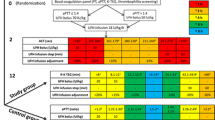Abstract
The effects of aprotinin, a broad-based proteinase inhibitor, in the management of hemorrhagic complications during prolonged venovenous extracorporeal CO2 removal in patients with adult respiratory distress syndrome are not evaluated. In two patients, aprotinin infusion was added to heparin to treat bleeding, occurring after few days of bypass and responsible for respiratory and hemodynamic deterioration. After aprotinin infusion (loading dose of 2×106 kIU followed by a continuous infusion of 5×105 kIU/h) combined with heparin, bleeding vanished until the end of bypass.
Similar content being viewed by others
References
Uziel L, Agostini A, Pirovano E (1982) Haematologic survey during low frequency positive pressure ventilation with extracorporeal CO2 removal. Trans Am Soc Artif Intern Organs 28:359–364
McCoy-Pardington D, Judd WJ, Knafl P, Abruzzo LV, Coombes KR, Butch SH, Oberman HA (1990) Blood use during extracorporeal membrane oxygenation. Transfusion 30:307–309
Green TP, Ischam-Schopf B, Steinhorn RH, Smith C, Irmiter RJ (1990) Whole blood activating clotting time in infants during extracorporeal membrane oxygenation. Crit Care Med 18:494–498
Verstraete M (1985) Clinical application of inhibitors of fibrinolysis. Drugs 29:236–261
Van Oeveren W, Jansen NJG, Bidstrup BP, Royston D, Westaby S, Neuhof H, Wildevuur CRH (1987) Effects of aprotinin on hemostatic mechanisms during cardiopulmonary bypass. Ann Thorac Surg 44:640–645
Royston D, Taylor KM, Bidstrup BP, Sapsford RN (1987) Effect of aprotinin on need for blood transfusion after repeat open-heart surgery. Lancet II:1289–1291
Dietrich W, Barankay A, Dilthey G, Henze R, Niekau E, Sebening F, Richter JA (1989) Reduction of homologous blood requirement in cardiac surgery by intraoperative aprotinin application. Clinical experience in 152 cardiac surgical patients. Thorac Cardiovasc Surg 37:92–98
Fraedrich G, Weber C, Bernard C, hettwer A, Schlosser V (1989) Reduction of blood transfusion requirement in open heart surgery by administration of high doses of aprotinin. Preliminary results. Thorac Cardiovasc Surg 37:89–91
Cattinoni L, Pesenti A, Mascheroni D et al. (1986) Low-frequency positive-pressure ventilation with extracorporeal CO2 removal in severe acute respiratory failure. JAMA 256:881–886
Moriau M, Rodhain J, Noel H, De Beys-Col C, Masure R (1974) Comparative effects of proteinase inhibitors plasminogen antiactivators, heparin and acetylsalicylic acid on the experimental DIC induced by thrombin. Thromb Haemostat 32:171–188
Hugues B, Parratt JR (1985) The effects of the protease inhibitor, aprotinin, on the course of shock induced by endotoxin in cats. Br J Pharmacol 86:399–403
Vandeplassche G, Schrauwen E, Houvenaghel (1983) Effects of the protease inhibitor aprotinin in endotoxin-shocked piglets. IRCS Med Sci 11:318–319
Winn R, Gleisner J, Maunder R, Harlan J, Hildebrant J (1986) Lung permeability and hemodynamics during endotoxemia: effect of aprotinin. J Surg Res 41:620–626
Etienne A, Hecquet F, Guilmard C, Soulard C, Braquet P (1987) Inhibition of rat endotoxin-induced lethality by BN 52021 and BN 52063, compounds with PAF-acether antagonistic effect and protease-inhibitory activity. Int J Tissue Reac 9:19–26
Katsuura Y, Kimura Y, Ohno N, Naito T, Okamoto S, Wanaka K (1989) DIC with and without MOF like syndrome: effect of selective synthetic-inhibitor (abstract). Thromb Haemostat 62:372
Svartholm E, Haglund U, Ljungberg J, Hedner U (1989) Influence of aprotinin, a protease inhibitor, on porcineE. coli shock. Acta Chir Scand 155:7–13
Chalkladakis GE, Kostakis A, Karydakis P et al. (1985) Effect of aprotinin on fibrinopurulent peritonitis in rats. Am J Surg 150:550–553
Haberland G, McConn R (1979) A rationale for the therapeutic action of aprotinin. Fed Proc 38:2760–2767
Putterman C (1989) Aprotinin therapy in septic shock (letter). Acta Chir Scand 155:367
Martinez-Brotons F, Oncins JR, Mestres J, Amargos V, Reynaldo C (1987) Plasma kallicrein-kinin system in uncomplicated sepsis and septic shock-comparison with cardiogenic shock. Thromb Haemostat 58:709–713
Harker LA, Malpass TW, Branson HE, Hessel EA II, Slichter SJ (1980) Mechanism of abnormal bleeding in patients undergoing cardiopulmonary bypass: acquired transient platelet dysfunction associated with selective alpha-granule release. Blood 56:824–834
Holloway DS, Summaria L, Sandesara J, Vagher JP, Alewander JC, Caprini JA (1988) Decreased platelet number and function and increased fibrinolysis contribute to post operative bleeding in cardiopulmonary bypass patients. Thromb Haemostat 59:62–67
Tanaka K, Takao M, Yada I, Yuasa H, Kusagawa M, Degushi K (1989) Alterations in coagulation and fibrinolysis associated with cardiopulmonary bypass during open heart surgery. J Cardiothorac Anesth 3:181–188
Van Oeveren W, Jansen NJG, Bidstrup BP, Royston D, Westaby S, Neuhof H, Wildevuur CRH (1987) Effects of aprotinin on hemostatic mechanisms during cardiopulmonary bypass. Ann Thorac Surg 44:640–645
Van Oeveren W, Harder MP, Roozendaal KJ, Eijsman L, Wildevuur CRH (1990) Aprotinin protects platelets against the initial effect of cardiopulmonary bypass. J Thorac Cardiovasc Surg 99:788–797
Dietrich W, Spannagl M, Jochum M et al. (1990) Influence of highdose aprotinin treatment on blood loss and coagulation patterns in patients undergoing myocardial revascularization. Anesthesiology 73:1119–1126
Author information
Authors and Affiliations
Rights and permissions
About this article
Cite this article
Brunet, F., Mira, J.P., Belghith, M. et al. Effects of aprotinin on hemorrhagic complications in ARDS patients during prolonged extracorporeal CO2 removal. Intensive Care Med 18, 364–367 (1992). https://doi.org/10.1007/BF01694366
Received:
Accepted:
Issue Date:
DOI: https://doi.org/10.1007/BF01694366




